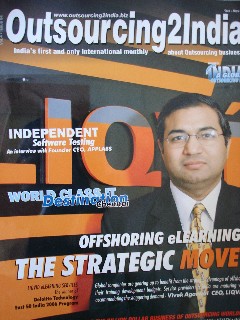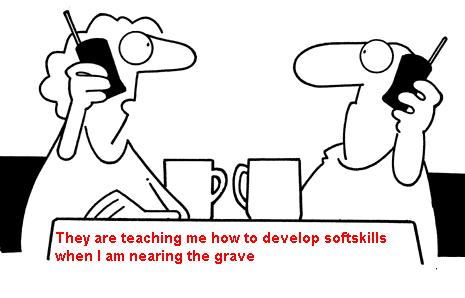President A.P.J. Abdul Kalam, one of the finest examples of Indian leadership, has vouched for e-learning. His recognition of e-learning is not just timely but a trendsetter of sorts given the fact that the Indian government has been extremely slow in accepting e-learning as a way to solve the issues of literacy in India.
What Kalam states makes perfect sense to educationists and researchers. The mammoth task of educating a ever-increasing mass of illiterates can only be realized through Internet technologies and applications. Its time government in Indian states look beyond the parochial five-year politics and plan education for a much longer time-frame. The education ministers in each state should undergo a complete training workshop under our brilliant President so that they are able to appreciate the wider benefits technologies like the Internet. If these education ministers cannot ready themselves for a change then its best for them to forego their charge from the ministry.
Tuesday, December 26, 2006
Tuesday, December 19, 2006
Free Online University: Another revolution round the corner!!
 Having given a run for their money to dubious content sellers Wikipedia is readying to launch another power-laced product -- a Free Online University. True to its democratic nature Wikipedia University will enable anyone and everyone to host e-learning courses or collaboratively develop learning materials. Currently the University is seeking assistance from netizens for a host of areas and its worth being a part of this great initiative.
Having given a run for their money to dubious content sellers Wikipedia is readying to launch another power-laced product -- a Free Online University. True to its democratic nature Wikipedia University will enable anyone and everyone to host e-learning courses or collaboratively develop learning materials. Currently the University is seeking assistance from netizens for a host of areas and its worth being a part of this great initiative. Though the reaction to this initiative from the global e-learning industry is not apparently noticeable, its definately sending jitters down the spine of most e-learning companies in India -- ones that are surviving on the edge. While its obviously a thing to rejoice for the global community as education sheds its boundaries and reaches out to the underpriviledged, its definately a death kneel for the e-learning service industry.
Wednesday, December 13, 2006
E-learning to replace teachers?
Redefining e-learning rules appears interesting. What it actually achieves is perhaps a different story. In Vietnam the National University has announced that it is going to arrest the paucity of teachers through e-learning. The vice director of National University believes that e-learning can enable the university educationh system in the country to produce 20,000 doctors and 1.8 million graduates.
E-learning surely will help Vietam meet its paucity of teachers and facilities but what concerns me is the way e-learning will replace the need of teachers for medical education. As far as my knowledge goes you cannot replace medical teachers with e-learning. If it were possible we would have witnessed a new breed of medics around the world -- e-doctors.
E-learning surely will help Vietam meet its paucity of teachers and facilities but what concerns me is the way e-learning will replace the need of teachers for medical education. As far as my knowledge goes you cannot replace medical teachers with e-learning. If it were possible we would have witnessed a new breed of medics around the world -- e-doctors.
Monday, December 11, 2006
Aptech off to Malaysia
 Aptech has finally decided to wrap up in India and head for Malaysia. Aptech's CEO Pramod Khera cites that since cost of skilled workers in India had risen sharply Malaysia is a more attractive destination because of its good manpower and infrastructure facilities.
Aptech has finally decided to wrap up in India and head for Malaysia. Aptech's CEO Pramod Khera cites that since cost of skilled workers in India had risen sharply Malaysia is a more attractive destination because of its good manpower and infrastructure facilities.By 'good' Pramod meant 'cheap'. With Aptech now heading to cheaper destinations the day, it seems, is not far when other companies will quickly follow suit. Wonder, should we say that the death-kneel of Indian e-learning has been struck?
Progressive Disclosure through Ajax
The mechanism of information disclosure is central to effective learning. Earlier developers used multiple pages to progressively disclose information. Today the same can be done with Ajax code and definately this can result in an improved user experience since all requested information can be found on the same page. Ajax can now enable users to seek more power, better features and ample options, as well as, experience learning with much simplicity.
Its time the Indian e-learning industry starts using Ajax coding.
Its time the Indian e-learning industry starts using Ajax coding.
Friday, December 08, 2006
Is Reliance Competent to handle E-learning?
Though its good news that e-learning is gaining ground in India the concern remains that the niche domain may soon loose its edge with e-learning becoming more of a fancy business decision than anything else. The latest news that Reliance will provide e-learning through its Webworld network is a concern for the industry.
Though its is not exactly clear how Reliance plans to weave out the content for these courses there is a feeling that Reliance will have to rope in some stable and established e-learning players rather than go on its own. If it doesn't the concept is surely not going to be a long-term thing. This considering Reliance's track record of not delivering what they promise, as has been witnessed in the case of its telephone services.
Though its is not exactly clear how Reliance plans to weave out the content for these courses there is a feeling that Reliance will have to rope in some stable and established e-learning players rather than go on its own. If it doesn't the concept is surely not going to be a long-term thing. This considering Reliance's track record of not delivering what they promise, as has been witnessed in the case of its telephone services.
Thursday, December 07, 2006
Liqvid eLearning is an acclaimed leader
 Leadership cannot be propagated through tall claims, it has to show up in action. So truly proved by Liqvid eLearning. With a stupendous growth of 450% Liqvid e-learning has been ranked 8th amongst the among the 50 fastest growing companies in India at the ‘Deloitte Technology Fast 50 India 2006’ award. At the same time, LIQVID has also been selected in the `Deloitte Technology Fast 500 Asia Pacific program'. The ranking is an international recognition for a true leader that has so far silently carved a niche for itself in the e-learning industry -- setting new quality benchmarks for others to follow.
Leadership cannot be propagated through tall claims, it has to show up in action. So truly proved by Liqvid eLearning. With a stupendous growth of 450% Liqvid e-learning has been ranked 8th amongst the among the 50 fastest growing companies in India at the ‘Deloitte Technology Fast 50 India 2006’ award. At the same time, LIQVID has also been selected in the `Deloitte Technology Fast 500 Asia Pacific program'. The ranking is an international recognition for a true leader that has so far silently carved a niche for itself in the e-learning industry -- setting new quality benchmarks for others to follow. Just about a month back I predicted that Liqvid is an e-learning leader in the making, even while indutry honchos laughed away my claim saying that it was too naive and immatured. Quite upto my expectations of their understanding of e-learning, they suggested that I could have made a better journalist if I would have said so about NIIT or their ilk. They talked of financials and several such sundry nuances. I remained unaffected by their affectations.
I always beleived that the best way to gauge leadership is not to look at financials but more at the base-level resources, at the actual resources that does the work. To me Liqvid offered a more vibrant work culture and matured professionalism -- bereft of willy-nilly mindless politics. The micro-level planning at work was meticulous, a quality that I fely was inherent only in leaders.
Today Liqvid's achievement is a personal gain for me, largely because it has enabled me to sustain my argument that leadership in the knowledge economy era is not the realm of the ones who hijack public opinion through glossy ads and publicity -- real leadership can be witnessed in unconventional places amongst unconventional professionals. I only hope that the so-called claimants to leadership in e-learning in India will revisit their system and learn to set their basics correctly. Its time e-learning professionals refute the arguments of the so-called stalwarts in the industry whose credentials, I feel, are as doubtful as their opinions.
Monday, November 27, 2006
E-learning unleashes its real Power
 Years back as a new entrant to the e-learning industry I found professionals going gungho about the benefits of e-learning. Today after all these years of learning on e-learning I realize that even at that time there were very few (in India) who could actually summarize the benefits of e-learning beyond the usual ‘global reach, lesser costs’ theory. Few could actually peer on futuristics.
Years back as a new entrant to the e-learning industry I found professionals going gungho about the benefits of e-learning. Today after all these years of learning on e-learning I realize that even at that time there were very few (in India) who could actually summarize the benefits of e-learning beyond the usual ‘global reach, lesser costs’ theory. Few could actually peer on futuristics.E-learning today is working wonders. David Dewhurst, the Professor of e-learning at Edinburgh University has achieved a rare feat of actually saving thousands of animals from being slaughtered through his powerful computer simulations.
As always, I maintain that the key to a successful e-learning initiative is to understand change, understand that learning should be freed from the parochial clutches of professionals who do not want to look beyond Instructional Designing. Today, one has to think about the frontier. And to that end a professional experience in e-learning can replace the cognitive rigours of academics. Its the scholar who can unfolding knowledge from the darkest legions of the human mind.
Perhaps this will take a while to change, bogged as e-learning resources are with offshored work that goes little beyond working on Instructional Designing and development. Perhaps it will come at a later time when Indian e-learning professionals will realize that what they have missed in their long career in e-learning is the ability to think out of the box, of the far-fetched, innovative possibilities. Right now the issue is about survival, of feeding dependants, of two square meals a day.
Thursday, November 23, 2006
Brands are not always the Best!
THE EMAIL I WROTE
Dearest [],
1. My present company gives me a flexi-timing that enables me to work more productively.
2. The work is project driven and no one is concerned how long I sat on my desk or wandered around (that makes me more responsible)
3. The annual increment is GUARANTEED between 25% to 100%. I am part of the strategic group in this company which means that I decide the communication strategy here and do not take the dictats of petty, incompetent managers.
4. I have a strict 5 days a week. And a 5 day strictly means 5 day.
5. A 5-star standard food (breakfast, lunch, dinner) that is supplied completely free.
7. I have free health insurance for me and my family.
Cheers!
Monday, November 13, 2006
Managing E-learning: Is this the trend?
 Last week an acquaintance working in the e-learning industry sent me a joke (from this website) that, he opined, perfectly captured the essence of the project managers in the e-learning industry in India:
Last week an acquaintance working in the e-learning industry sent me a joke (from this website) that, he opined, perfectly captured the essence of the project managers in the e-learning industry in India:A man goes into a pet shop to buy a parrot. The shop owner points to three identical looking parrots on a perch and says, "the parrot on the left costs 500 dollars".
"Why does the parrot cost so much," asks the man.The shop owner says, "well, the parrot knows how to use a computer".
The man then asks about the next parrot to be told that this one costs 1,000 dollars because it can do everything the other parrot can do plus it knows how to use the UNIX operating system.
Naturally, the increasingly startled man asks about the third parrot to be told that it costs 2,000 dollars. Needless to say this begs the question, "What can it do?"
To which the shop owner replies, "to be honest I have never seen it do a thing, but the other two call him boss!"
Finally the Indian Government wakes upto E-learning
Better late than never. Finally the Indian Government has appreciated the potential of e-learning. The Department of Income Tax (DIT) has roped in NIIT for a innovative STE (Source-Train-Enable) programme where NIIT will select 5000 candidates for becoming ‘Certified Tax Return Preparers’. Over the past one decade even as India has emerged as a e-learning courseware development hub for global companies and governments, e-learning as a tool for training and education was ignored by the Indian government largely due to the apathy of its maladroit bureaucracy.
Let's hope that the wisdom of the Indian government grows as they adopt more e-learning initiatives for others departments. With a academician Prime Minister at the helm, there could be no better time than this for India to streamline its education, training and information dissemination initiatives through e-learning.
Let's hope that the wisdom of the Indian government grows as they adopt more e-learning initiatives for others departments. With a academician Prime Minister at the helm, there could be no better time than this for India to streamline its education, training and information dissemination initiatives through e-learning.
Friday, November 10, 2006
Who said e-learning comes cheap?
 Journalists and regular writers have the unusual habit of sounding what sounds sweet. For instance claims that e-learning is cheap has has rattled the pillars of learning for long. Everyone is gung ho on the "low cost" as they peruse through arbit reports and features on the subject. But that's just a common opinion -- the ground realities say that elearning is definately COSTLY.
Journalists and regular writers have the unusual habit of sounding what sounds sweet. For instance claims that e-learning is cheap has has rattled the pillars of learning for long. Everyone is gung ho on the "low cost" as they peruse through arbit reports and features on the subject. But that's just a common opinion -- the ground realities say that elearning is definately COSTLY.Lets consider a scenario in India and calculate the cost factor.
First, the actual competent e-learning resources do not come cheap. This since learning is not about being able to write a script in flawless english and then prinking pictures here and there. True learning experts are people who have honed their skills after years of toil.
At the delivery end, any e-learning course has to run on a system such as an LMS that enables the administrators to track the learning progess. LMS prices are not cheap. Even an average LMS can be bought at nothing less than 40-50lakhs. Add to it the enhancements and maintenance involving a team of programmers.
Finally when the e-learning course is deployed that's not the end. Its just the beginning. Apart from a few subjects such as softskills, most courses would require updations and enhancements. This too requires a cost.
For the ones bugging the naive with all that "cost talk", I suggest that they look at elearning holistically -- the dynamism, the expertise required, the delivery mechanism, the constant maintenance and updations required and so on. Its not a magic pill that will erode all learning problems once and for all.
Wednesday, November 08, 2006
Terrorism E-learning courses now!
 E-learning is a clear winner. E-learning has finally caught on with terrorism. Its news for the e-learning fraternity that Informa has joined forces with the Centre for the Study of Terrorism and Political Violence (CSTPV) at the University of St Andrews to offer the first transnational e-learning course in the study of terrorism. The 16-week course enables participants to receive a solid grounding in the causes, consequences and responses to terrorism.
E-learning is a clear winner. E-learning has finally caught on with terrorism. Its news for the e-learning fraternity that Informa has joined forces with the Centre for the Study of Terrorism and Political Violence (CSTPV) at the University of St Andrews to offer the first transnational e-learning course in the study of terrorism. The 16-week course enables participants to receive a solid grounding in the causes, consequences and responses to terrorism.And now the flip side. Even while the terrorism courses are being created one wonders whether actual terrorists will get hold of these courses and redefine their modus operandi. The other concern is that terrorism as a subject is extremely dynamic and requires real-time capture of data without which the courses will become a mere "content junk" as they will not be enable learners to practice their learning in countering terrorist attacks or making any difference to this onerous issue that impacts the society at large.
However, the attempt to develop e-learning courses for terrorism is laudable. The first stride is important. The rest will follow.
Tuesday, November 07, 2006
Thomson sells NETg with a Thud!
 Finally the giant e-learning division was sold off to its competitor. Thomson's prestigious e-learning division Thomson NETg was bought by SkillSoft plc, its e-learning rival, for a whooping $285 million. And as this huge money changes hands the fate of about 300 employees lurks in the dark.
Finally the giant e-learning division was sold off to its competitor. Thomson's prestigious e-learning division Thomson NETg was bought by SkillSoft plc, its e-learning rival, for a whooping $285 million. And as this huge money changes hands the fate of about 300 employees lurks in the dark. While selling off Thomson NETg Richard Harrington, the Chief Executive Officer said that though Thomson Learning is an excellent business it "does not fit with our long-term strategic vision."
So while the deal closes by the first half of 2007, a more pressing concern confronts Indian companies, particularly the ones that were dependent on NETg for a good chunk of their business. What of the employees that were recruited by these Indian vendors who have spent a major part of their lives only working for developing only NETg courses?
With Skillsoft at the helm now, getting NETg projects for Indians companies will remain a challenge for the days to come. Its likely that Skillsoft will analyze Indian vendors now on more stringent parameters.
Unpredictability undoubtedly is the king in e-learning.
Friday, November 03, 2006
NASSCOM should rank E-learning Companies!!

Its time we struck a fine balance between authentic claims and misleading information. As the e-learning industry in India gets innundated in unsolicited claims by e-learning companies that they are "Best in India" and the "Largest", its become all the more essential to seperate the wheat from the chaff. The ramifications of such loud claims have been pretty expensive and tasking for clients. Though an exact figure is not available there are countless instances where global clients have learned their lessons the hard way -- that financial figures and gigantic sizes are not always an indication of the e-learning capabilities. Some organizations like the General Motors have already learnt from experience that offshoring e-learning development to India is not always about cost-cutting. There's more to it.
Its time NASSCOM comes forward and provides a robust mechanism to rate all e-learning companies in India. Not only will this help in generating more trust but will shove aside the incompetent players who have been bringing the industry to disrepute.
Thursday, November 02, 2006
NIIT receives Dataquest Award 2006
Its time for NIITians to rejoice. NIIT has bagged the Award for being No. 1 IT Training Company in India from Dataquest. Dataquest cited that "NIIT...is now nearly 1.5 times bigger than the combined revenues of the next 4 players put together."
I think a broader and a better analysis by dataquest for the award would have been to analyze the leader in developing quality training courses -- perhaps an average of revenue, reach and impact. NIIT is 1.5 times bigger does not sound impressive. Size unfortunately fails to impress everyone. Its time we think beyond simple size and economics.
I think a broader and a better analysis by dataquest for the award would have been to analyze the leader in developing quality training courses -- perhaps an average of revenue, reach and impact. NIIT is 1.5 times bigger does not sound impressive. Size unfortunately fails to impress everyone. Its time we think beyond simple size and economics.
Tuesday, October 31, 2006
India's First Education Portal...at Last!!!
 Too late or too early -- its best left for debate. The Indian government has finally got an educational portal "Sakshat" in shape. The portal was launched by President Abdul Kalam on Monday.
Too late or too early -- its best left for debate. The Indian government has finally got an educational portal "Sakshat" in shape. The portal was launched by President Abdul Kalam on Monday.Being a researcher certain issues concern me. Its news to me that the content for the portal is being developed by UGC, AICTE, IGNOU, NCERT, KVS, NVS, CBSE, IITs and IISc. While names like IITs, IISc and UGC evoke respect, others such as IGNOU are better ignored. Consider the facts. For several years now the university has not been able to update its distance learning course material for subjects such as Journalism. And this is not due to lack of will; rather the infighting for supremacy between hoardes of self-proclaimed intellectuals who incessantly hover around flaunting their political reach and prowess.
Back in the year 2000, as a researcher for DD-GyanDarshan, I experienced the intellectual potential and capability of IGNOU. I was a researcher who already knew his findings before conducting the research. It was then that I predicted an early death for DD-GyanDarshan. And I was correct. The educational channel today moves in a crippling pace inviting very little attention. Perhaps the only audience left for it are the ones who create the programs. Nevertheless the channel serves as a potential money-vending medium for a sizeable chunk of so-called TV professionals who would not be bought even free by any of these private channels. Today, the news of the innauguration of the educational portal evokes concern because I am worried whether it is another medium poised for an early death?
Tuesday, September 12, 2006
The Making of E-learning Leaders
Leadership knows no shortcuts. It comes through factors such as persistence, maturity, a global outlook and a smart workforce. Liqvid eLearning Services proves just that...
Occasionally I confront queries from laymen and laywomen asking me to identify India's upcoming leaders in e-learning. I maintain that the answer to the question is difficult yet agree that the best e-learning companies in India are to be found outside the North Indian belt, in Maharasthtra, Tamil Nadu and Andhra Pradesh, amongst others. However, exceptions remain.
Personally, one of my favourite e-learning companies in North India is Liqvid E-learning, a Noida based organization that appears to have redefined the way e-learning is created and delivered. My choice for Liqvid comes after closely observing several e-learning companies in the NCR region spanning several years. And these are the key takes for my choice:
Bright minds: The company has some of the brightest e-learning talent in the industry. They know their job well.
An informal atmosphere: Unlike other e-learning companies in the region who remain transfixed in the quagmire of hierarchy and senior-junior tangle, Liqvid professionals do not find themselves alienated in either the PM group, the ID group or the graphics group. The vile trappings of power, position, and hierarchy give way to freedom and free-flowing communication between professionals.
Nonintrusive management: The management is comparitively non-intrusive and the senior management people do not sit "on top of the heads" of its workforce.
Non-politicized: There is no evidence of politics being a key take between the members of the workforce, unlike most e-learning companies in the region.
Note: Personally I have some great friends in Liqvid. And to cut a long story short these guys are equally adept at e-learning as they are in other creative pursuits like composing music, jokes and enabling the development of a ambience that is less prudish and more humane. They have helped me realize that life holds more in its bouquet -- finer sense and sensibility.
Occasionally I confront queries from laymen and laywomen asking me to identify India's upcoming leaders in e-learning. I maintain that the answer to the question is difficult yet agree that the best e-learning companies in India are to be found outside the North Indian belt, in Maharasthtra, Tamil Nadu and Andhra Pradesh, amongst others. However, exceptions remain.
Personally, one of my favourite e-learning companies in North India is Liqvid E-learning, a Noida based organization that appears to have redefined the way e-learning is created and delivered. My choice for Liqvid comes after closely observing several e-learning companies in the NCR region spanning several years. And these are the key takes for my choice:
Bright minds: The company has some of the brightest e-learning talent in the industry. They know their job well.
An informal atmosphere: Unlike other e-learning companies in the region who remain transfixed in the quagmire of hierarchy and senior-junior tangle, Liqvid professionals do not find themselves alienated in either the PM group, the ID group or the graphics group. The vile trappings of power, position, and hierarchy give way to freedom and free-flowing communication between professionals.
Nonintrusive management: The management is comparitively non-intrusive and the senior management people do not sit "on top of the heads" of its workforce.
Non-politicized: There is no evidence of politics being a key take between the members of the workforce, unlike most e-learning companies in the region.
Note: Personally I have some great friends in Liqvid. And to cut a long story short these guys are equally adept at e-learning as they are in other creative pursuits like composing music, jokes and enabling the development of a ambience that is less prudish and more humane. They have helped me realize that life holds more in its bouquet -- finer sense and sensibility.
Tuesday, June 13, 2006
E-learning has a new follower in the Indian Government
If the latest news is to be believed, the Indian government has woken up to e-learning. BSNL Pune is launching multiplayer services that include e-classes, among other things. And Maharashtra Knowledge Corporation Ltd (MKCL) is gearing to supply the content. Elsewhere, at the 1st ICT conference, the Indian Embassy in Addis Ababa declared that India is committed to develop and promote E-learning in Africa.
Amidst this entire hullabaloo, several questions arise. Can organizations like BSNL sustain the project and provide quality e-learning to its subscribers, given the poor records of project implementation of the government? Even while BSNL has been unable to maintain a flawless and functional telephone network in the country, does it auger well for the organization to venture into areas that require cutting-edge talent and human resources. Of course being optimistic in such innovative ventures helps. A failure, however, could be devastating for the government which can loose face before everyone. A failure would also reinforce the government's inability to smoothly execute any 'dream project' and it will serve as an example for the years to come.
The African initiative again would mean that the government has to pull in resources to ideate the projects and then implement it. Where will the government find resources for this? Perhaps the government will seek the services of private e-learning organizations in India for this. And even with this step things are going to be difficult as the government has no regulatory body for e-learning companies. A few Indian e-learning companies are enlisted with NASSCOM, but simple enlistment does not mean that they are 'competent'. Only time will tell how the Indian government fare in the challenge they face in Africa.
Amidst this entire hullabaloo, several questions arise. Can organizations like BSNL sustain the project and provide quality e-learning to its subscribers, given the poor records of project implementation of the government? Even while BSNL has been unable to maintain a flawless and functional telephone network in the country, does it auger well for the organization to venture into areas that require cutting-edge talent and human resources. Of course being optimistic in such innovative ventures helps. A failure, however, could be devastating for the government which can loose face before everyone. A failure would also reinforce the government's inability to smoothly execute any 'dream project' and it will serve as an example for the years to come.
The African initiative again would mean that the government has to pull in resources to ideate the projects and then implement it. Where will the government find resources for this? Perhaps the government will seek the services of private e-learning organizations in India for this. And even with this step things are going to be difficult as the government has no regulatory body for e-learning companies. A few Indian e-learning companies are enlisted with NASSCOM, but simple enlistment does not mean that they are 'competent'. Only time will tell how the Indian government fare in the challenge they face in Africa.
Friday, May 12, 2006
Leap-frogging E-learning: The new era begins

Leap-frogging, the mainstay of Indian development scenario, now finds a new follower in the Indian e-learning industry. So even while most organizations still struggle while creating flawless CBTs and WBTs, some companies are eyeing the gen-next mobile learning. Wonder! Is e-learning fated for an ugly death in the hands of these "knowledge marauders".
So here’s the new baby in town: mobile learning. Even as Gartner declared that India is going to have the largest number of mobile subscribers in the world by 2009, e-learning managers have crowded conference rooms in their quest to understand the situation – prospects and futuristic fundas. Expert opinion is being sought and e-learning companies are frantically trying to tie-up with mobile service providers in trying to work out ways in which learning could be easily provided for Indian learners.
The flurry is however as usual: more hype and little understanding. What Gartner has suggested in the number of mobile subscribers and not the ‘quality’ of mobile subscribers. So even if the mobile service providers try to ‘pack’ talk-time with some ‘learning modules’ the concept may not work. Most Indian subscribers are likely to be people who are illiterate and have no need for hi-tech learning. And they are not going to be interested in ‘soft-skills’ and ‘managerial lessons’ at all. Perhaps a lesson on ‘how to make a living’ could be high on their list of preferences. And with a ‘knowledge-starving’ e-learning industry in India the first subscribers of the ‘how to make a living’ course could be e-learning professionals themselves.
It perhaps makes more sense for Indian e-learning companies in avoiding the quantitative figures in mobile subscribers in India and look for a pie in the mobile learning phenomenon sweeping others regions of the world – in the US and Europe.
Sunday, April 16, 2006
Inviting your Comments
Woops! Thanks for your qualitative responses. I like this space to come up as a virtual meeting place for all e-learning experts and enthusiasts. Your observations on the Indian e-learning industry is essential to give everyone a factual and rational information on Indian e-learning. Do write me your observations! Dash me your mail at india.elearn@gmail.com.
Cheers,
AC
Cheers,
AC
Wednesday, April 12, 2006
Websites take clients for the infamous ‘Indian ride’
 Hiding behind snazzy graphics and animations are websites of Indian e-learning companies that are strikingly erroneous – smeared with incorrigible elements that are simply boisterous, over-jazzed or downright atrocious. The results are perhaps obvious as more and more international e-learning clients today refuse to be taken on the ‘Indian ride’ as they stand demanding more details. Its time Indian companies revamp their websites to portray the ‘facts’ as they are.
Hiding behind snazzy graphics and animations are websites of Indian e-learning companies that are strikingly erroneous – smeared with incorrigible elements that are simply boisterous, over-jazzed or downright atrocious. The results are perhaps obvious as more and more international e-learning clients today refuse to be taken on the ‘Indian ride’ as they stand demanding more details. Its time Indian companies revamp their websites to portray the ‘facts’ as they are.The indubitable truth, folklorists say, follows like a spook. This is perhaps true with the Internet medium that offers unlimited scope for the audience to see through the farcical. Quite oblivious of the concept of how and what they communicate, several Indian e-learning companies appear to have hurriedly put together websites that make dubitable claims on their e-learning capabilities. This desperation is perhaps driven by increased local competition where each company is trying their level best to woo the ‘best international clients'. Unfortunately these websites reveal the secrets -- pretty easily.
The Graphic Blunder
Apparently e-learning websites carry captive images of cheerful men and women drawn from a diverse global culture: African, American and European. Impressive though, these smiling faces are definitely not the real people behind the company’s e-learning efforts. In reality, the entire workforce consists of Indians.
By positioning the photographs of foreigners, these companies portray Indians in bad light. They tend to reinforce that Indian employees are inferior, incapable and incompetent. The practice perhaps seeks to reinforce the notion that Indian e-learning professionals lack competence and formal training that is so essential in e-learning. Surprisingly, there’s no voice against this misguided approach. Perhaps e-learning professionals accept this as a whiff of fate.
Jargon-smeared literature
Jargons are a craze in most e-learning companies. Phrases such as ‘top of the line’, ‘cutting-edge’ and ‘top notch’ are being used excessively thereby diluting the essence of the communication. There are examples of e-learning companies hiring copywriters from the advertising industry to help them perform the ‘trick.’
Jargons are passé and it is doubtful whether the old tricks work fine with all western clients. Indian companies perhaps seem to have forgotten that the hype surrounding the new media is long dead ever since the dot com bust in the late 1990s. Clients now firmly believe that there is no alternative to quality work – the ones delivering quality work need not ‘shout’ at the top of their voice, they get noticed even if they lie low.
Client List: Brand Transfer
The next strategy problematic area in websites is the long display of foreign clients on the home pages. Client logos are displayed as a priced element, with the sole objective of transferring value to their otherwise ‘valueless’ entities. Client list makes sense for big organizations such as Tata Interactive Services (TIS) and NIIT – for others, it’s calamitous. Some of the clients displayed in the websites of smaller companies are ones who got a few odd jobs worth a few thousand dollars done and never returned back. Yet, Indian companies carry their relationships with pride – a relationship that never was.
Suggested Measures
Its time e-learning companies in India start looking at the facts on the face. The best way to serve the international clientele is to come out with the truth through a truthful account of their capabilities, their resources and their intentions. Carried for long, these websites this could well mean the death knell for the industry in India as clients scout for other sincere service providers in China and other cheaper destinations across the world. Sincerity helps!
Subscribe to:
Posts (Atom)